
Do you have trouble understanding native English speakers?
Do you find it difficult to improve your listening skills, or feel like you don’t have the time to practice?
If you have these problems, keep reading.
In this guide, you’ll learn:
- Why most people fail to improve their English listening
- How to “successfully” improve your listening skills
- What if you don’t understand the material?
- Special advice for beginners
- Why your listening improves slowly (even though you listen to English quite a lot)
- Is there a way to “quickly” improve your listening?
Let’s get started.
Why Most People Fail to Improve Their English Listening Skills

There’s only one reason people fail: they don’t listen to enough English.
Makes sense, right? If you spend 1,000 hours listening to English, your listening will definitely improve.
Unfortunately, here’s what many people do to improve their listening:
- Watch a few movies in English every week.
- Listen to something in English 3 – 5 times a week.
- Listen to English for 15 minutes per day.
These actions are weak. They aren’t significant enough to make a difference.
Think about it. If you listen to English for 15 minutes a day. One year from now, you will have listened to only 91 hours of English.
This is not enough! It will take you many years to see an improvement.
People Who Listen to English a Lot Also Fail!
Some people spend several hours a day listening to English. They know that to improve their listening , they need a lot of practice.
Unfortunately, these people usually fail to improve their listening as well.
Why is that?
Here’s what usually happens:
- At first, they’re motivated to improve their listening. They decide to listen to English for 2 hours every day.
- After a while, they have trouble finding time to practice.
- Finally, they lose motivation and give up.
- Because they quit too soon, their listening skills didn’t improve.
This is how many “motivated” English students fail. They practice hard in the beginning, but then they quit soon afterwards because they can’t maintain that kind of practice.
Here’s the lesson to be learned: for your English listening skills to improve, you must listen to English regularly over a long period of time.
Listening to English for several hours per day “for a month” is not enough. You need to do it for many months (or over a year).
How to “Successfully” Improve Your Listening Skills (Even If You Don’t Have Time)
Want to improve your listening “successfully”?
If you do these two things, your success is 100% guaranteed:
- Listen to a lot of English every day.
- Do it for a long period of time.
But how do you do that if you don’t have time?
Let me share a few tips to overcome this problem.
Success Tip #1: Make Sure Your Phone Always Has English Listening Material
First, you need to download a lot of English listening material to your phone. This way, you can listen to English no matter where you are.
What kind of English material to download to your phone?
Podcasts.
Podcasts are audio shows (English conversations) which you can download from the Internet for free.
To download podcasts to your phone, you need a podcast app.
Go to your app store and search for “podcast app” and pick one with good ratings.
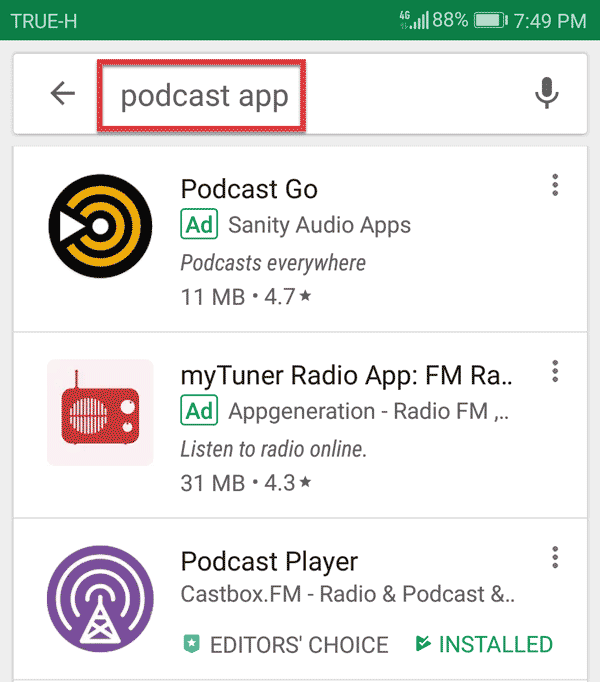
Once installed, open the podcast app and search for podcasts by entering a search term. (Just enter something you’re interested in.)
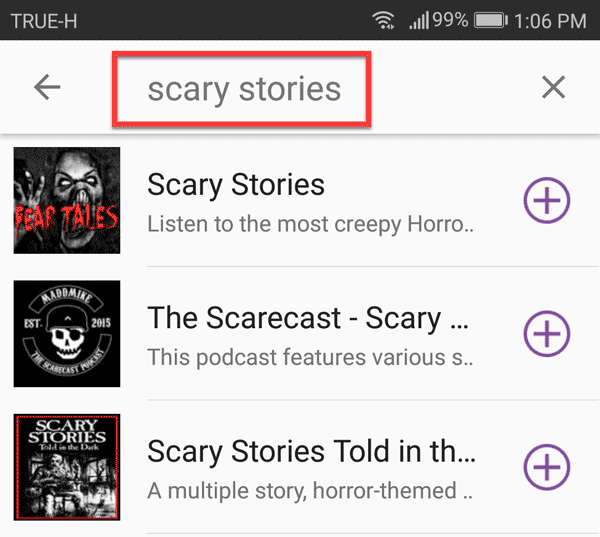
After that, you will be able to listen or download podcast episodes.
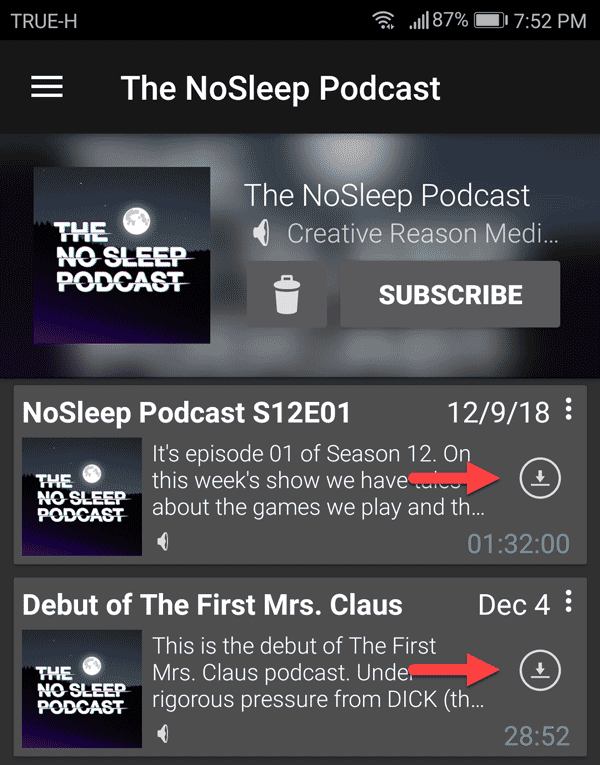
For a list of podcasts to listen to, please visit this page.
Success Tip #2: Turn Boring Time into Listening Time
Take a look at the activities below. What do they have in common?
- Driving.
- Riding a bus/train.
- Doing house chores (washing dishes, cooking, etc.)
- Working out.
- Waiting for something.
These activities have one thing in common: they don’t require concentration or deep thinking.
Throughout the day, there are a lot of activities like the examples above. These are the best times to improve your English listening skills!
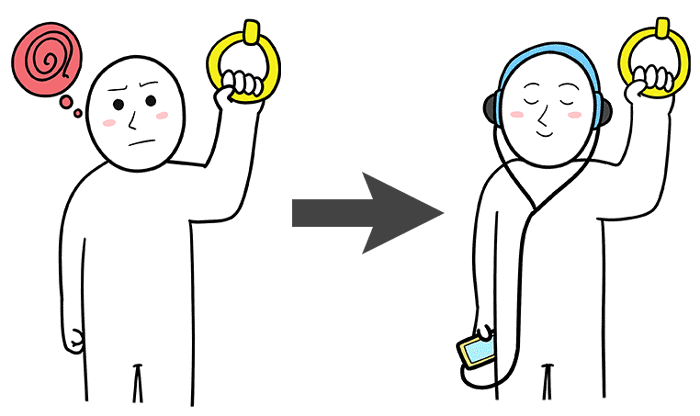
Make sure to listen to some English during these activities. By doing so, it’s quite easy to listen to English for 1 – 2 hours every day.
Do you see the brilliance of this strategy? This is how you can improve your listening even if you don’t time. Even busy people can do this!
Success Tip #3: Make It Fun & Entertaining!
We all spend time each day on entertaining stuff: playing games, surfing the Internet, gambling, etc.
We spend lots of time on these things because they are fun and addictive.
So, if you want to spend a lot of time listening to English, just make it entertaining. If you do that, it’s easy to improve your listening skills. (And you don’t have to force yourself to do it.)
But how do you make “listening to English” fun?
Let me give you a couple of ideas.
Idea #1: Subscribe to Entertaining Channels on YouTube
Watching YouTube is a great way improve your English listening comprehension.
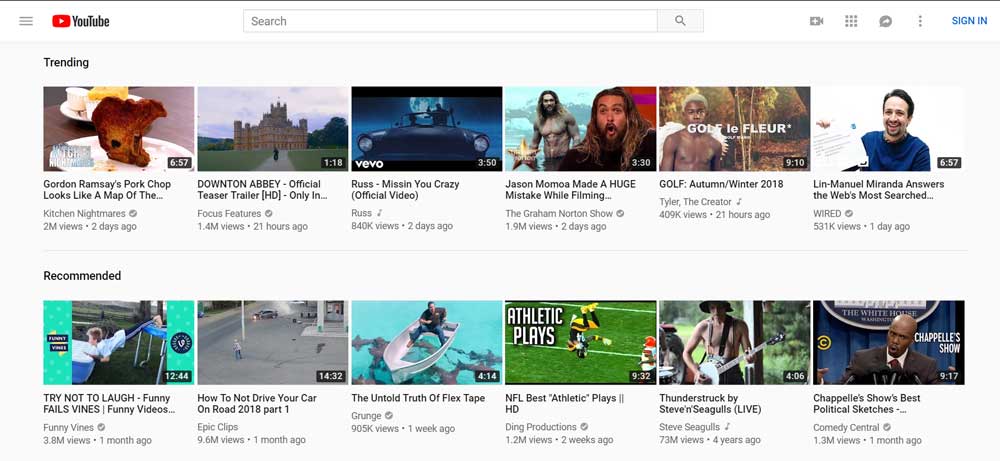
There’s a lot of English content on YouTube, and the website is designed to be addictive.
Since YouTube always recommends new and interesting videos to its viewers, you don’t have to manually search for new videos to watch. All you need to do is keep clicking on those video thumbnails and enjoy the videos.
This is why YouTube is so addictive, and you can use that to your advantage.

Start subscribing to channels that interest you. (Of course, the channels have to be in English.)
Personally, I’m interested in Japanese manga (comics), scary stories, movies, and toys. So, I’m subscribed to channels related to those things.
These channels are always producing new videos, so I always have new English content to listen to.
Another great thing about YouTube are captions (subtitles).
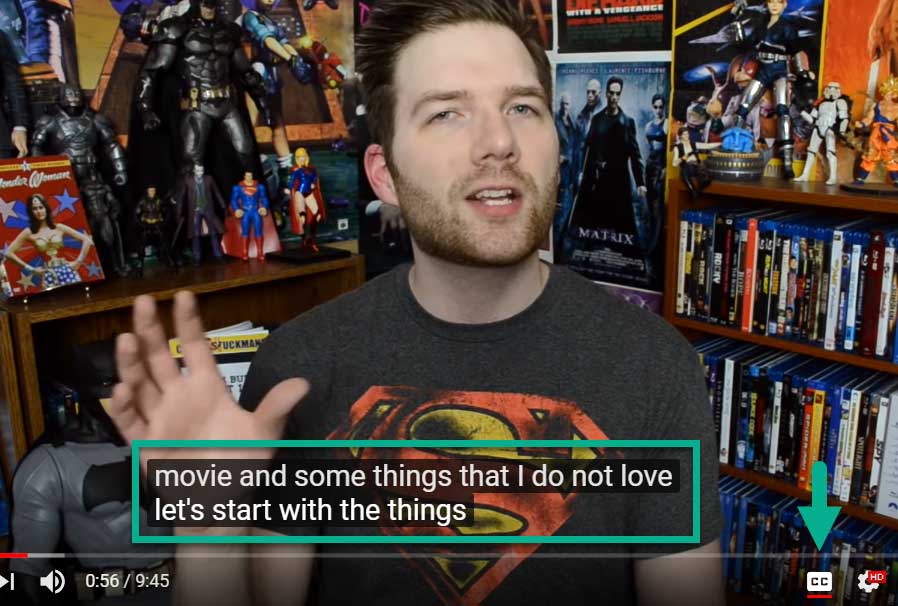
If you have trouble understanding a video, you can turn on captions. Although they’re usually generated by computers, they are pretty accurate and useful.
Note: make sure to only enable captions when it’s necessary. If you can understand 80 – 90% of the content, you should disable captions so that you can focus on listening
Idea #2: Binge-Watch Popular Television Series & Movies
In the past, it was a bit difficult to find American or British TV series to watch.
But that’s no longer the case. With a service like Netflix, you can get instant access to thousands of TV shows and movies!

The best part is, Netflix is super cheap. In my country, Thailand, the standard plan is only $11 per month.
So, for only $11, I can watch unlimited TV series and movies for an entire month.
So, that’s how you can make listening practice entertaining. If you adopt one or both of the ideas, you’ll get to (1) improve your listening skills and (2) have fun. That’s killing two birds with one stone!
What If You Don’t Understand The Material?

What if you don’t understand what you’re listening to, and there’s no transcript?
Or maybe there’s a transcript but you can’t read it because you’re listening and driving at the same time.
What should you do?
Well, you have three options.
Option #1: Do Nothing
It’s not a big deal if you don’t understand some parts of the conversation as long as you understand the main idea. You don’t need to read the transcript just because you can’t make out some words or sentences.
Now you might be wondering, “If I don’t read, how will I learn the meaning of new vocabulary?”
This is a common concern. Some English students believe that in order to learn new words, they must look up those words in a dictionary. They believe that it’s the only way to learn new words.
But that’s not true! The truth is, your amazing brain has the ability to learn the meanings of new words from context (surrounding words). This is how you learned your native language (without using transcripts or dictionaries).
So, don’t worry if you don’t know some words when listening to English. If you hear people use those words multiple times in different contexts, your brain will eventually figure out the meanings of those words.
But what if the material to is too difficult? And you don’t even understand the main idea. What do you do?
In this case, let’s talk about the next option.
Option #2: Listen to Something Easier
When some students start listening to something, they try to finish it even though it’s too difficult to understand. Trying to do so is painful. After a while, these students usually quit improving their listening altogether!
This behavior is ridiculous. There’s a lot of free English material on the Internet. And new English material is created every day. Therefore, there’s absolutely no need to “finish” what you start.
If the material you’re listening to is very difficult (or boring), just delete it and find something else to listen to.
But what if almost everything is too difficult for you? What do you do?
In this case, let’s discuss the next option.
Option #3: Read in English to Learn New Vocabulary

If you feel like almost everything you listen to is too difficult to understand, your vocabulary is probably very small. That’s why you have trouble understanding most English conversations.
In that case, I suggest that, other than listening to English, you also read in English to quickly learn words and phrases commonly used in conversations. For recommendations on what to read, check out this resource.
Special Advice for Beginners
If you’re a beginner, here’s my special advice for you….
Start small.
At first, don’t do anything that will discourage you and make you quit. If you quit, everything will be all for NOTHING.
I said earlier that you must listen to English a lot. But in the beginning, don’t worry about that yet. Instead, please focus on getting yourself to listen to English “every day” (even if it’s just 10 – 15 minutes per day).
At this stage, you goal is NOT to improve your listening. Your goal is to develop the habit of regular listening. Once the habit is formed, improving your listening will be easier.
Here are things you shouldn’t do in the beginning (because they might make you quit):
- Listening to something that’s quite difficult to understand.
- Forcing yourself to listen to English for several hours a day.
- Beating yourself up when you feel like you’re not practicing enough.
In the beginning (the first month), it’s okay to listen for just 10 – 15 minutes a day. It’s also okay to listen to something that’s very easy to understand. Just make sure that you do it (almost) every day.
If you fail to listen to English for a few days, that’s okay. Don’t beat yourself up. Don’t use that as an excuse to quit. Just relax, and promise yourself that you will listen to some English the next day.
Why Your Listening Improves Very Slowly (Even Though You Listen To English Quite A Lot)

Is your listening improving at a snail’s pace?
This is a common problem among intermediate listeners.
Many intermediates feel like their listening has stayed at the same level for years, even though they still listen to English regularly.
This is something that I’ve experienced myself.
When I began to improve my listening, it didn’t take long for me to notice an improvement.
However, as time passed, it became more and more difficult for me to notice any improvement. I was still listening to English regularly, but my listening seemed to be improving at an extremely slow pace.
At the time, I didn’t know why. But now I do.
If you haven’t noticed a significant improvement in your listening in a long time, here’s the reason:
You keep listening to things you can “easily” understand.
Here are examples:
- You keep listening to the same speakers whom you can understand very well.
- You only listen to American English, but not British English.
- You keep listening to the same topic(s). For example, you only listen to business podcasts.
Don’t get me wrong. It’s fine to listen to easy stuff because it can still improve your listening. But be careful. If you only listen to something easy, don’t expect to see a quick improvement.
It’s like trying to improve your piano skills by only playing simple songs like “Happy Birthday to You.” It’s not effective.
Is There a Way to “Quickly” Improve Your Listening?
Yes, there is. Here’s how:
Listen to “challenging” English material.
Let me explain.
First, let’s divide English material into three categories based on difficulty:
- Too difficult to understand.
- Easy to understand.
- Challenging.
Let’s discuss which category is best.
Category #1: Too Difficult to Understand
This is the kind of material in which you can’t even understand the main idea.
If you listen to something and think, “I have no clue what they’re talking about”, then you’re listening to this kind of English material.
It’s a waste of time to listen to something you don’t understand. So, you should avoid this kind of listening material.
Category #2: Easy to Understand
This is the kind of material in which you can understand almost every single word. (Example: a talk by a native speaker who speaks slowly and clearly.)
The reason intermediate students have trouble improving is that they only listen to this kind of material.
Category #3: Challenging
Challenging English material are conversations in which you cannot make out every single word or sentence, but you still understand the main idea.
Examples of challenging material:
- A conversation in which people speak a bit fast (but you can still follow the conversation).
- A conversation that contains some words and phrases you don’t know (but you still understand the main idea).
- A conversation in which you can understand 80 – 90% of the content.
This is the best kind of English material to listen to.

Want to know why beginners improve fast? It’s because, for them, almost everything they listen to is challenging. When you expose yourself to challenging stuff, you improve quickly.
So, if you’re an intermediate or advanced listener who wants to improve quickly, make sure that you listen to a lot of challenging stuff.
Here are a few ideas on how to do that:
- Listen to speakers who don’t speak clearly – Don’t keep listening to people whom you can perfectly understand. Some speakers are more difficult to understand than others. Listen to those people as well.
- Listen to various topics – Don’t keep listening to conversations on the same topics. Make sure to listen to topics that you aren’t familiar with as well.
- Listen to both American and British English – If you’re already good at listening to one of these accents, practice listening to the other accent as well.
Summary: How to Improve Your English Listening Skills
These are the most important things you’ve learned from this article:
- You must listen to a lot of English every day. The best way to do that (without spending your free time) is to listen to English during activities that don’t require concentration or deep thinking.
- Another way to listen to a lot of English is to make it entertaining by binge-watching interesting YouTube channels and popular TV shows and movies.
- If you’re a beginner, make sure to start small in the beginning. And if possible, you should also read in English to learn some new vocabulary.
- If your listening comprehension is at an intermediate level, and it seems like it’s no longer improving, listen to challenging English material MORE.
The Last Thing You Should Know
Everything I share in this article is meant to be a guideline, not a rule that can’t be broken.
If you disagree with some of the points I made, feel free to ignore them. If you think some of my advice is too difficult to follow, feel free to disregard the advice.
For example: I suggested that you should listen to both American and British English. But if you only want to improve your ability to understand American English (maybe you’re currently working or studying in USA), then feel free to listen to only American English.
Here’s another example: I said earlier that you should listen to various topics. But if you feel bored when you listen to new topics, and doing so discourage you from listening to English, then please ignore that advice.
My point is, you don’t have to believe everything I say. Treat my advice as a guideline, not a rule.
Thanks for reading. I hope you find this article useful 🙂